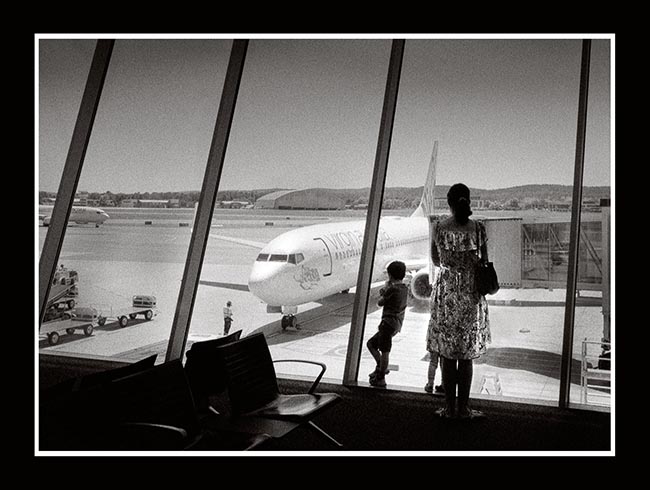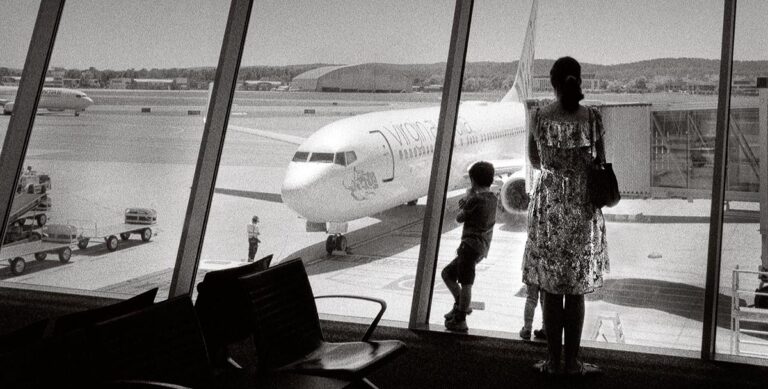Bruce Cowell, an artist working in fine-art photography, has been capturing the world through his lens for over forty years. Based in Canberra, Australia, his journey in photography is a blend of professional work across various genres and a deep-seated passion for fine art. Through his fine-art photography, Cowell connects with people by telling visual stories that resonate on a deeply personal level.

Cowell’s approach to photography is not merely about documenting moments but about revealing the underlying essence of human experiences. He believes that a photograph should speak to viewers, allowing them to infuse their own worldviews and life experiences into the image. This collaborative completion of the artwork is central to Cowell’s philosophy. His photographs are more than just images; they are narratives that invite viewers to explore and find meaning within their own lives.
One of Cowell’s works is a photograph simply titled “Canberra Airport.” This image encapsulates much of what his work stands for – the ability to see the eternal in the everyday. The photograph depicts a mother with her young children at the airport, either bidding farewell or eagerly awaiting someone’s arrival. It’s a scene familiar to many, playing out in airports worldwide every day. Yet, in Cowell’s hands, it becomes a poignant exploration of love and its profound significance in our lives.
Cowell describes the photograph with heartfelt simplicity: “This photograph, like so many of my images, is about love. A mother with young children waits at the airport either to say goodbye or perhaps hello to someone important. A variation on a theme that’s playing out in the lives of so many people everywhere every day. For me, fine art photography exists to see the eternal in the everyday and this image touches upon the eternity of love and its importance in our lives.”
Love, as Cowell portrays it, is the thread that weaves through the fabric of human existence. It gives meaning to our lives and a purpose on which everything else depends. His images, often drawn from real-life scenarios, invite viewers to reflect on their own experiences and the universal emotions that bind us all. “Canberra Airport” is not just a snapshot of a moment; it’s a meditation on the timeless nature of love and its role in shaping our lives.
Cowell’s ability to capture such profound themes in seemingly ordinary settings is a testament to his skill and vision as an artist. His work invites viewers to pause and consider the deeper narratives at play in their own lives. In a world where the pace of life often obscures these subtleties, Cowell’s photographs serve as a reminder to look closer, to see the beauty and meaning in the moments we might otherwise overlook.
Beyond “Canberra Airport,” Cowell’s portfolio spans a diverse range of subjects, each treated with the same thoughtful attention to detail and emotional depth. Whether it’s a bustling cityscape, a quiet rural scene, or an intimate portrait, his photographs consistently offer viewers a window into the universal themes of love, connection, and the human experience. His work is a testament to the power of photography to transcend time and place, speaking directly to the heart.
In an era dominated by digital images and rapid consumption of visual content, Cowell’s work stands out for its contemplative and enduring quality. His photographs are not just to be viewed but to be experienced, each one a story waiting to be told. They are a call to engage more deeply with the world around us, to see beyond the surface and discover the eternal truths that lie within.
Bruce Cowell’s fine-art photography continues to inspire and connect with audiences, offering a visual language that transcends cultural and personal boundaries. Through his lens, the ordinary becomes extraordinary, and the everyday moments of life are elevated to their rightful place as the cornerstones of our shared human experience. His work reminds us that, at its core, life is about love and connection, and it is these themes that give our lives meaning and purpose.

